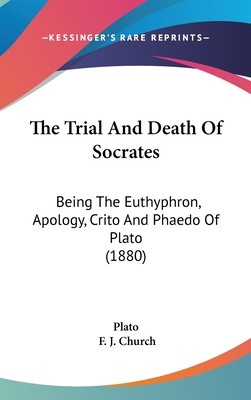
- We will send in 10–14 business days.
- Publisher: Kessinger Publishing
- ISBN-10: 1437434568
- ISBN-13: 9781437434569
- Format: 15.2 x 22.9 x 2.1 cm, hardcover
- Language: English
- SAVE -10% with code: EXTRA
The Trial And Death Of Socrates (e-book) (used book) | bookbook.eu
Reviews
Description
The trial and condemnation of Socrates (469-399 B.C.) on charges of heresy and corrupting young minds is a defining moment in the history of Classical Athens. In tracing these events through four dialogues, Plato also developed his own philosophy, based on Socrates' manifesto for a life guided by self-responsibility. Euthyphro finds Socrates outside the court-house, debating the nature of piety, while The Apology is his robust rebuttal of the charges of impiety and a defense of the philosopher's life. In Crito, while awaiting execution in prison, Socrates counters the arguments of friends urging him to escape. Finally, in Phaedo, he is shown calmly confident in the face of death, skilfully arguing the case for the immortality of the soul. The vindication of Socrates and the pathos of his death are admirably conveyed in Hugh Tredennick's modern translation.
EXTRA 10 % discount with code: EXTRA
The promotion ends in 20d.05:34:53
The discount code is valid when purchasing from 10 €. Discounts do not stack.
- Publisher: Kessinger Publishing
- ISBN-10: 1437434568
- ISBN-13: 9781437434569
- Format: 15.2 x 22.9 x 2.1 cm, hardcover
- Language: English English
The trial and condemnation of Socrates (469-399 B.C.) on charges of heresy and corrupting young minds is a defining moment in the history of Classical Athens. In tracing these events through four dialogues, Plato also developed his own philosophy, based on Socrates' manifesto for a life guided by self-responsibility. Euthyphro finds Socrates outside the court-house, debating the nature of piety, while The Apology is his robust rebuttal of the charges of impiety and a defense of the philosopher's life. In Crito, while awaiting execution in prison, Socrates counters the arguments of friends urging him to escape. Finally, in Phaedo, he is shown calmly confident in the face of death, skilfully arguing the case for the immortality of the soul. The vindication of Socrates and the pathos of his death are admirably conveyed in Hugh Tredennick's modern translation.


Reviews